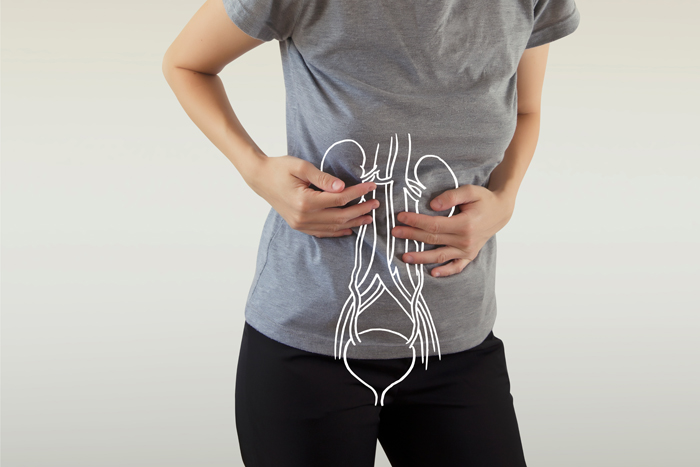Kidney Diseases Treatment & Diagnostics in Karol Bagh, Delhi
Kidney Diseases
Kidneys filter extra water, waste products and fluids from your body. They also clean your blood and control your blood pressure. Kidney diseases can affect your body in many ways.
A damaged kidney can lead to fluid buildup in your body. Fluid build-up can lead to swollen ankles, weakness, nausea and poor health. Urology doctors in Karol Bagh advise timely treatment of kidney diseases, otherwise, your kidneys will eventually stop working.

What are the symptoms of kidney diseases?
Signs and symptoms of kidney diseases appear slowly. You need to consult a urologist specialist in Karol Bagh if you experience the following symptoms:
- Vomiting
- Nausea
- Fatigue
- Loss of appetite
- Problem in sleeping
- Muscle cramps
- Swollen feet and ankles
- Persistent itching
- If fluid builds up around the lining of the heart, you will experience chest pain and tightness.
- Gradual loss of mental sharpness
- If fluid builds up in the lungs, you will experience shortness of breath.
- High blood pressure
- Changes in your pattern of urination.
What causes kidney diseases?
- The causes of acute kidney diseases are:
- Insufficient blood flow to the kidneys
- When the kidneys are directly damaged
- Shock because of severe sepsis.
- Autoimmune diseases can cause acute kidney diseases
- An enlarged prostate blocks your urine flow
The causes of chronic kidney diseases are:
- Viral illnesses such as HIV, AIDS and hepatitis
- Inflammation in the glomeruli of your kidneys
- A genetic condition called polycystic kidney disease, where cysts form in your kidneys
- Type 1 and type 2 diabetes
- High blood pressure
- Immune system diseases such as lupus nephritis
- A urinary tract infection called pyelonephritis which leads to scarring in the kidneys
When do you need to see a doctor?
You should consult a urologist in Karol Bagh if you experience any signs and symptoms of kidney diseases. Your doctor will decide your line of treatment depending on whether you have acute or chronic kidney diseases.
Request an appointment at Apollo Spectra Hospitals, Karol Bagh, New Delhi.
Call 1860 500 2244 to book an appointment.
What are the risk factors?
Factors that might increase your risk of kidney diseases are:
- High blood pressure
- Diabetes
- Obesity
- Smoking
- Cardiovascular diseases
- Abnormal structure of the kidney
- Family history of kidney diseases
- Old age
How are kidney diseases treated?
Several kidney diseases are treatable. They just require treatments to control symptoms and reduce complications. Chronic kidney diseases do not have a cure. In many cases, a urologist near you will treat the underlying cause of your kidney damage to retain the normal functioning of your kidneys. If your kidneys can’t function on their own, your urologist will opt for the following treatments:
- Dialysis: There are two types of dialysis, hemodialysis and peritoneal dialysis.
- Minimally invasive kidney surgeries: there are four types of minimally invasive procedures to treat kidney diseases:
Laparoscopic procedure - In this procedure, several small punctures are made in the abdomen. A telescope and surgical instruments are inserted to allow the surgeon to operate using the video system.
Robotic procedure - Robotic arms are placed in the abdomen to assist in surgery. This procedure is helpful in only reconstructive procedures.
Percutaneous procedure - In this procedure, a single puncture is made through the skin. Instruments are inserted in the kidney using ultrasound or fluoroscopy.
Ureteroscopic procedure - In this procedure, a scope is inserted through your urinary tract to treat kidney diseases.
Conclusion
Kidney diseases such as tumors, cysts, stricture diseases, kidney stones, reconstruction of urinary tract problems or removal of poorly functioning kidneys can be done through minimally invasive procedures. Chronic kidney diseases are not curable but they can be managed through symptom control. Therefore, you should visit urology hospitals in Karol Bagh as soon as you experience symptoms of kidney diseases.
CKD refers to chronic kidney disease. You are suffering from CKD if you have reduced kidney functioning for more than three months.
Blood tests, urine tests and certain imaging tests such as MRI and MRA are done to assess the kidneys. A kidney biopsy may be done to know the cause of kidney damage.
Dialysis is a process to clean and filter the kidneys when the kidneys cannot do those functions themselves. Hemodialysis and peritoneal dialysis are the two types of kidney dialysis.
Our Top Specialities
NOTICE BOARD
CONTACT US
CONTACT US
 Book Appointment
Book Appointment


.svg)
.svg)
.svg)
.svg)








